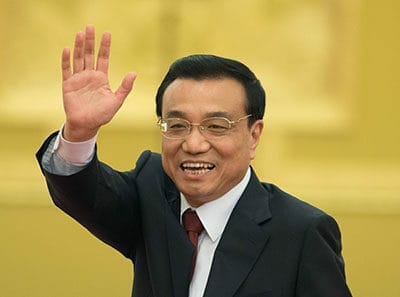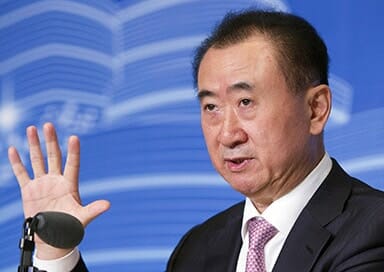
State Council chief Li Keqiang demonstrates how to wave goodbye to Chinese outbound real estate investors
China’s State Council issued new rules on Friday spelling out restrictions on overseas investments by Chinese entities, which specifically target transactions involving real estate, hotels and other areas where mainland companies have become dominant cross-border players over the past five years.
The circular, Guidelines on Further Guiding and Regulating Overseas Investments, was approved by the equivalent of China’s cabinet, and jointly attributed to the Ministry of Commerce, the National Development and Reform Commission (NDRC), the Ministry of Foreign Affairs, and the People’s Bank of China.
Click here for Mingtiandi’s English translation of the full text of the circular
The new rules clarify restrictions that have informally been put in place over the last year which have already scuttled deals for major investors including Wang Jianlin’s Dalian Wanda Group, HNA Group and Anbang Insurance.
Property Deals Limited After Record Investment Levels in 2016

All of Wang Jianlin’s favorite sectors are now out of his reach
The State Council’s circular explains that the new guidelines, which group investments into categories to be “encouraged,” “limited,” and “prohibited” are provided “to strengthen the macro guidance of overseas investment, to further guide and regulate overseas investment, to facilitate the continuous, orderly and healthy development of overseas investment, to effectively guard against all types of risks, and to better meet the needs of national economic and social development…”
The transaction restrictions come after Chinese investors spent a record $33 billion on purchases of overseas commercial and residential real estate in 2016, according to a report earlier this year by property consultancy JLL. That figure, which represented a 53 percent increase from the 2015 level, may prove to have been the high water mark for Chinese property investment for the foreseeable future, as the State Council’s new rules now require investors to gain regulator approval before real estate transactions can be carried out.
China Implements Restrictions Following Capital Outflows
The circular directs local governments and ministries, in the case of real estate and other restricted industries, to “guide companies to invest in a prudent manner, and give the necessary guidance and reminders based on the specific situation.” Unlike earlier rules concerning foreign investment, no specific guidelines are given for allowing deals below a set threshold to be conducted without approvals.
The establishment of equity investment funds or platforms outside of China which are not tied directly to specific projects are also grouped into the “limited” category, along with hotels and real estate. Transactions involving film studios, entertainment businesses, and sports clubs, which had become favorites of tycoons such as Wanda’s Wang Jianlin, are also included in the “limited” category.
The rules which were spelled out on Friday confirm practices that have been evident since late last year after China burned through $320 billion in reserves during 2016 – ending the year with $3.01 trillion in foreign currency, its lowest level since early 2011. And the country’s central bank was being forced to prop up a yuan which was increasingly under pressure from short sellers.
New Rules Follow Regulator Action

No “For Sale” sign on Anbang’s Waldorf Astoria yet
After first cracking down on illegal and grey market capital outflows during the second half of 2016, by early this year Chinese regulators were targetting deals deemed “irrational” by investors both large and small.
Dalian Wanda, which committed to more than $6 billion in overseas real estate projects since 2013, and invested several billion more in overseas entertainment deals, was forced to foreswear cross-border projects last month. The property and entertainment conglomerate was among the first to feel regulator wrath in 2017, after having its $1 billion attempt to acquire Hollywood TV production studio Dick Clark Productions shot down during the first quarter of the year.
Earlier this month Wanda, which is China’s largest builder of malls, announced to the Hong Kong stock exchange that it is selling stakes in nearly $4.5 billion in real estate projects across the UK, US, China and Australia to a privately held company controlled by its chairman Wang Jianlin, in a move that many analysts see as a prelude to disposing of the overseas assets.
Also during August, Anbang Insurance, whose chairman Wu Xiaohui was detained by government agents in early June, dismissed a Bloomberg report that Chinese authorities are pressuring the firm to sell off its more than $10 billion portfolio of foreign assets, including New York’s Waldorf Astoria after it had been one of China’s biggest buyers of overseas real estate assets in the last two years.
Liberalisation Pronounced Dead
While the State Council circular contained few surprises following the practical restrictions of deals this year, the document puts down in writing a major policy reversal following a period in which China’s top authorities had urged the country’s commercial champions to “go global.”
During 2014 China’s NDRC had announced a series of liberalisations of outbound investment by Chinese firms, including raising the threshold deal size that required the planning body’s approval from $100 million to $1 billion, except for deals involving “sensitive” sectors or locations.
By mid-2015, the State Council had announced the planned removal of limits on outbound investment in stocks, bonds and real estate by both Chinese individuals and businesses. However, as China’s currency came under increasing pressure, some of these liberalisations were never implemented, and now they have been superseded by the circular issued on Friday.
OBOR All OK, Sexual Services Not So Much
While the State Council’s rules lay out higher levels of scrutiny for real estate and hotel deals, the new document does instruct regulators to encourage deals which facilitate China’s “Belt and Road” initiative, as well as transactions which help to develop or secure new technology or natural resources which can be seen as helpful to China’s development.
On the blacklist are deals involving exports of “core technologies,” and investment in gambling or sexual services.
Leave a Reply